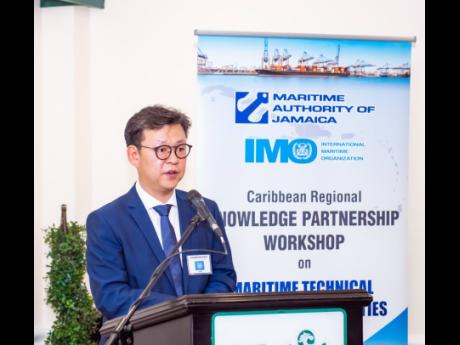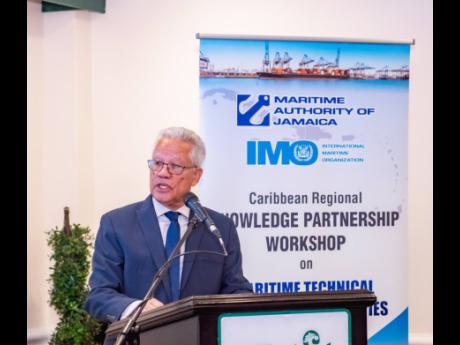Maritime Authority of Jamaica hosts IMO first Caribbean regional Knowledge Partnership Workshop
In an innovative approach, maritime leaders, along with international and regional development agencies, gathered in Kingston last week to participate in the first Caribbean Regional Knowledge Partnership Workshop on maritime technical cooperation activities, organised by the International Maritime Organization (IMO) in collaboration with the Maritime Authority of Jamaica (MAJ).
Representatives of maritime communities from Caricom States and overseas territories shared information on marine-related activities they are currently undertaking and communicated the best practice application of official development assistance (ODA) funding.
The workshop was aimed to develop knowledge partnership mechanisms for development cooperation activities in the maritime field, to share IMO’s resource mobilisation strategy and to seek possible cooperation opportunities.
Youngso Kim, head of resource mobilization and partnerships in the Technical Corporation Division of the IMO, said, “IMO has been doing a lot of technical cooperation work through their Integrated Technical Cooperation Programme in the form of seminars, fellowships for tertiary education, workshops and various training events, and while these activities are very important, the IMO is using the Knowledge Partnership mechanism to facilitate the implementation of more project-type activities which meet the needs of member States”.
Director General of the MAJ, Rear Admiral (ret’d) Peter Brady said, “The workshop provided a platform for donors to identify the needs and demands of recipients; for recipients to have better access to the various resources available to address their needs; to improve the understanding of each other’s mechanisms of operation; and to build an enhanced network of knowledge partnerships and communication.”
Brady further stated, “We started with expectations for some better communication and linkage with the development agencies with whom many of us as senior maritime administrators have had, at the most, casual acquaintances. So, our number one expectation or objective, I have to say, has been achieved”.
In sharing another achievement of the workshop, Brady said, “Our next expectation was to inform, build up the knowledge of maritime affairs in a more detailed way inside of the ODA agencies. Have we achieved that? Have we informed sufficiently, and clearly, the representatives here about our roles and responsibilities, and the limitations that prevent us from meeting the mandate of the IMO and, by extension, our own safety and security and pollution prevention within our maritime space and of our ships and vessels?.”
“I do believe that we have articulated our limitations, principally the lack of domestic maritime legislation, the enshrinement of the mandatory IMO legal instruments for implementation. This implementation is not possible then, without two things: one, having the pertinent legislation, and two, having the qualified people with training and the capability to provide for the implementation”.
Rear Admiral Brady expressed, “the knowledge partnership concept has now transitioned from smart idea, or concept, to that of a real possibility which, as we progress, will evolve into a workable mechanism for the identification of both human and material resource requirements and become an additional pathway to obtain access to non-traditional funding which can be sourced outside of the IMO’s Integrated Technical Cooperation Programme.”
Kim who facilitated the workshop explained that it was significantly important to host the workshop in the Caribbean as these Small Island Developing States are in need of these types of technical cooperation assistance, and this Knowledge Partnership Workshop brings together in the same room, maritime administrations and development corporations in a bid to synchronise the technical maritime experience with the necessary funding.
Kim also said, “It was crucial to match maritime administrations with the development authorities, as well as match developing partners with the potential donors and in so doing, build up a network. This network between maritime people and development corporation people is very important in terms of aligning our maritime activities with the development plans of the countries of the region.”
Jamaica satisfying MARPOL obligations
The Maritime Authority of Jamaica (MAJ) facilitated a technical visit by delegates from the workshop to a waste reception facility in Hill Run, St Catherine. This facility is operated by CEAC Solutions Limited, and is equipped with an incinerator which handles MARPOL waste, including food waste and medical waste. Jamaica is actively seeking to implement legislations to incorporate the provisions of MARPOL, which is the International convention for the prevention of pollution by ships.
Through regulators, such as the MAJ, National Environment and Planning Agency, Ministry of Health and Wellness and other government agencies, CEAC Solutions coordinate the relevant service providers in a reliable manner, ensuring that MARPOL and other environmental obligations are met.
“This technical visit was one of the most important features of the workshop”, said Kim. “The visit provided so many opportunities to learn from each other – country to country, region to region, and today participants witnessed best practices which they can take back home to their countries.”
Next steps
The question is asked, what of the next steps? Rear Admiral Brady said, “The knowledge partnership development will be further examined and explored at the Senior Maritime Administrators Workshop, scheduled for March 5-6, 2020, in St Lucia, where success stories for implementation using a project-based method will be shared by IMO”.
The IMO is also very confident about the success of these knowledge partnership initiatives. “The IMO is seeking to be a matchmaker between the needs of the countries and the access to the available funding, so that projects will actually happen, projects will get off the ground and be executed”, said Kim.
He said the fact that necessary entities which can address the needs of the member States through funding makes for a very good productive cooperation.
He cautioned, however, that countries must realise that these processes can be difficult and sometimes take a long time to come together, “but we need to start somewhere, countries must not try to run before they can walk. Rather than try to go too fast, we want to take the logical path and try to implement viable, sustainable projects”.
The Caribbean is one only the second region around the world where the IMO has hosted a Knowledge Partnership Workshop. The first workshop was held in December 2019 in Asia.
In April of 2020 Knowledge Partnership Workshops will be held in Western and Central Africa; Pacific Islands in September 2020, and near the end of the year one will be hosted in North Africa.
IMO’s expectation is that with funding from international development banks and other donors, these workshops may be convened annually, which will also be a means of monitoring activities and projects undertaken by maritime administrations across the region.
The Jamaica workshop was held from January 20 – 24, 2020, with representation from a number of agencies from across the Caribbean , and Maritime Authorities of Antigua and Barbuda, Bahamas, Barbados, Belize, Curacao, Dominica, Grenada, Guyana, Haiti, Jamaica, St Kitts and Nevis, Saint Lucia, St Vincent and the Grenadines, Sint Maarten, Suriname, Trinidad and Tobago.
Development corporations which participated in this knowledge partnership workshop included Caribbean Development Bank, Inter-American Development Bank, other development agencies, as well as the Commonwealth Secretariat and other regional bodies.



